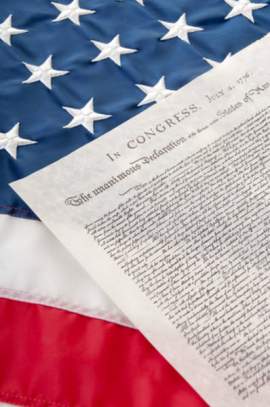
Understanding the Congress of the Confederation

Popular In Constitution
Purpose Of Lifetime Appointment And Pros And Cons Enumerated Powers Bicameral Legislature Background Article 3 Of The Constitution We The People 1st Amendment Who Wrote The Constitution Judicial Review Equal Protection Clause 5th Amendment 10th Amendment Three Fifths Compromise
Article I, Section I of the United States Constitution allows for the creation of the Legislative Branch. The Constitution states that this branch shall be comprised of a bicameral legislature, to be named the Congress. Each body, or House, provide for a system of representation for the States at the Federal level. Congress is to be divided in the Senate and the House of Representatives. The implementation of a bicameral system would be a deviation of prior precedence established by the Articles of Confederation, which employed a unicameral system for State representation.
The Articles of Confederation would become the law of the land and would be implemented in 1781. Under this body of laws, the United States implemented a unicameral legislature known as the Congress of the Confederation. The main purpose behind the adoption of the system was that the framers of the Articles of Confederation had a legitimate concern of creating a body of government with centralized power. They believed that if too much authority could be given to a centralized body of government, the possibility for despotism and a tyrannical government would be too great. Therefore, the Congress of the Confederation would be the only branch of government in place, with no executive and judicial branches instituted. Congress was given minimal power, with most of the authority being diverted to the States.
The unicameral Congress gave representation to all the states on an equal level, while also allowing the states to have the power to veto most decisions determined by the Congress of Confederation. The only powers the Congress of Confederation had were to regulate foreign and military affairs. Furthermore, Congress at the time had no real power over the States, for they were considered sovereign entities. This meant that Congressional decisions could ultimately be ignored by the States. Eventually, the ineffectiveness of this type of Federal Government would become more than obvious, for economic disputes between the states would erupt due to the lack of uniformity and cohesive legislation.
This would eventually lead for the Congress of the Confederation to meet on the Convention of 1787, which was called for the purpose of revising and amending the Articles of Confederation. It would be James Madison that would first propose the concept of a bicameral Congress. His plan called for a Lower House to be elected directly by the people, while the Upper House would be elected by the Lower House. However, representatives of smaller states would argue in favor of maintaining a unilateral legislature for it provided for equal representation among the states.
Eventually, the two proposed types of legislature would be combined in a compromise. The House of Representatives, or the Lower House, would provide State representation in proportion to the population of a given State. The Senate would maintain equal representation of the states. Senators would be elected by State legislatures and the Representatives would be directly elected by the people.
The Convention of 1787 would eventually result in the drafting of the United States Constitution, in which the new bicameral legislature would be implemented. Under the new Constitution, Congress would not have more powers so as to provide for a stronger Federal Government. It would dissolve some of the problems under the Articles of Confederation and it would still maintain the sovereignty of the states by delegating specific powers to other issues. Furthermore, a bicameral Congress would provide an internal system of checks in balances in the newly implemented Legislative Branch by delegating certain duties and responsibilities to each House so as to not centralize all the power into one holistic faction.



















